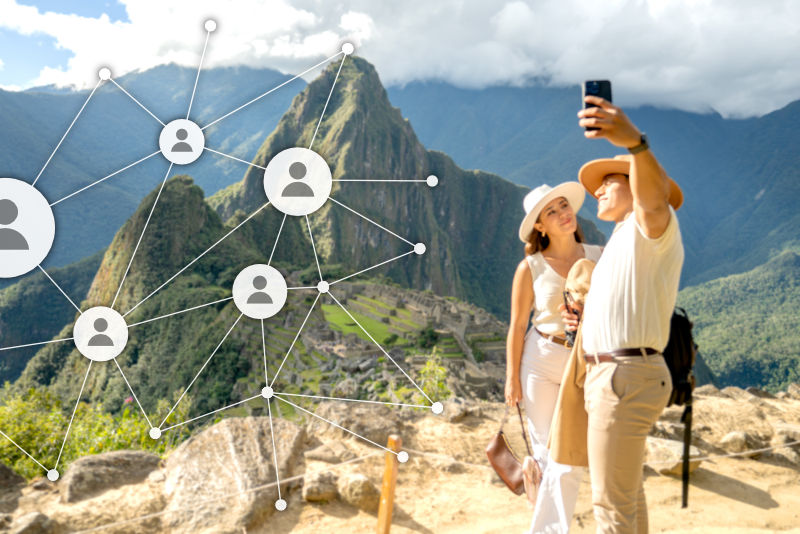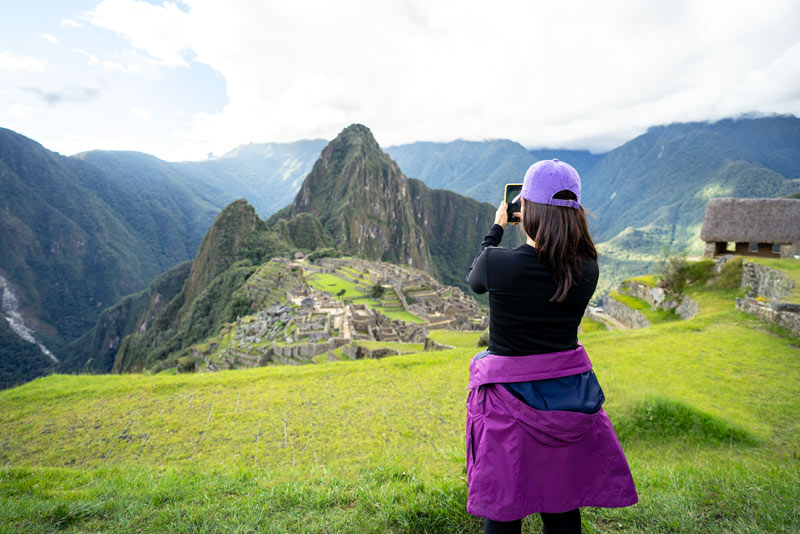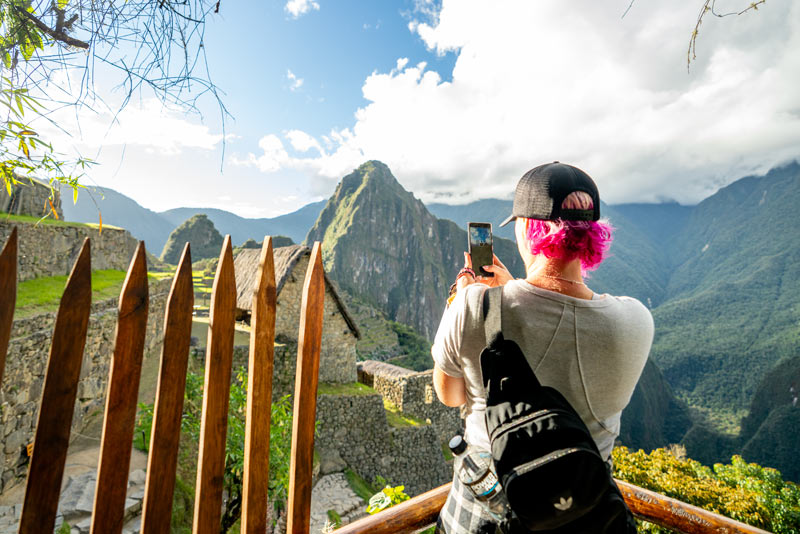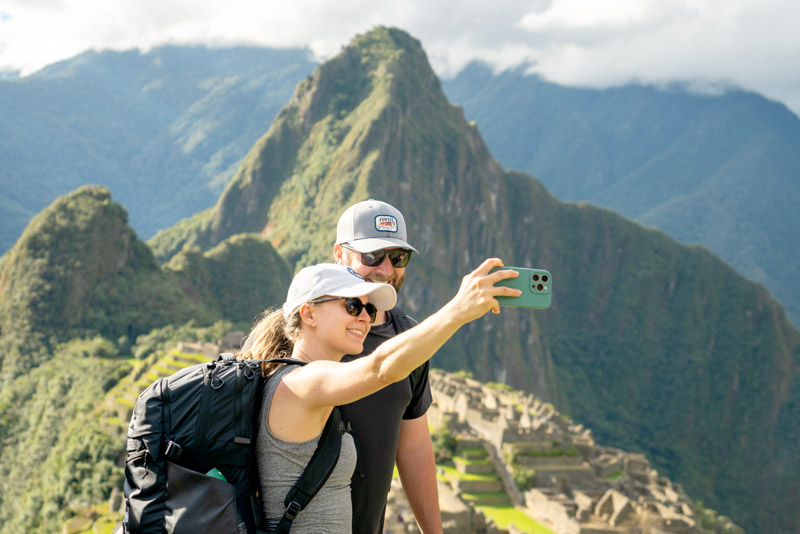How to have internet and signal in Machu Picchu during your trip to Peru?
These days, everyone wants to be connected, especially if they’re in a place like Machu Picchu. Traveling always puts your connectivity at risk, from finding places to purchase internet plans to checking if Machu Picchu has a stable signal for communication. In this article, we offer some tips to stay connected and have all the information you need for good connectivity during your trip to Peru.
- How can I stay connected during my trip to Machu Picchu?
- Is there signal in Machu Picchu?
- Low signal coverage areas in Cusco
- What will you need to stay connected in Peru?
- How to buy and use a SIM card in Peru?
- Tips for your trip to Machu Picchu
- Frequently asked questions about cellular communication in Peru
How can I stay connected during my trip to Machu Picchu?
There are many ways to stay connected in Peru, Cusco, and Machu Picchu without racking up huge roaming bills. One common way is to have an unlocked cell phone, which will allow you to use a low-cost SIM card during your trip to Machu Picchu. SIM cards can be found in many locations throughout the city, where companies like Claro, Entel, Movistar, and Bitel will provide you with one at a very low cost (around 5 to 10 soles). You can also purchase internet packages at these locations to stay connected during your travels in Peru.
Staying connected while exploring Cusco and Machu Picchu is easier than ever, and it doesn’t have to break the bank. Here are the best options for staying online without paying international roaming charges.
Book your Machu Picchu ticket in advance.
If you’re planning a trip to Machu Picchu, remember to book your ticket at least two months in advance if you want to access one of its popular routes. For ticket options that take you to Huayna Picchu, for example, you should book three months in advance to secure your spot at the Wonder of the World.
Use an eSIM or buy a local SIM
Most travelers today choose to purchase an eSIM card, which you can activate even before arriving in Peru, with mobile data ready to use as soon as you land. Platforms like Airalo, Holafly, and Nomad offer plans for Peru starting at $5, giving you much greater security.
If your phone doesn’t support an eSIM card, you can purchase a physical prepaid SIM card from carriers such as Claro, Entel, Bitel, or Movistar. These are available at airports, shopping centers, or official stores throughout the city. Physical SIM cards cost around 5 to 10 soles, and you can easily top up your internet data from apps or at physical stores.
Requirements:
- Your cell phone must be unlocked (free from carrier lock).
- It must be compatible with the LTE/GSM bands used in Peru, which most current cell phones do.
Cell phone locked or unlocked
Remember that in addition to GSM compatibility, your cell phone must be unlocked to work properly with a SIM card from a Peruvian mobile operator. Locking a phone is intended to ensure that the phone is used only with its own carrier.
An unlocked phone doesn’t have any software lock, so it can be used with SIM cards from any Peruvian phone operator.
Buy international data
If you don’t want to go through the hassle of buying local chips, finding shopping centers that sell them, and other issues, your mobile operator’s international data plans can be a great option. Although more expensive, they allow you to plan your trip more efficiently without having to worry about connectivity. Remember to check if your operator offers daily or weekly packages for your trip through Peru.
Is there signal in Machu Picchu?
There’s no cell phone coverage at the Machu Picchu citadel itself, or at least not for most of the route. At the entrance, we may encounter moments of poor coverage, just enough to inform us that we won’t have a signal, or to gather the necessary information to explore this wonder of the world.
In Aguas Calientes (Machu Picchu town), you’ll find a signal at all times, although there won’t be any signal coverage during the trip from Aguas Calientes to Machu Picchu. Also, if you want to explore the outskirts of town, you should be aware that you won’t find a strong signal, so it’s recommended to download the route you want to explore to avoid any potential issues.
Low signal coverage areas in Cusco
| Signal coverage areas in Cusco | ||
|---|---|---|
| Area | Coverage level | Details |
| Historic Center of Cusco | Very good | Good signal coverage, although it can be saturated during high season. |
| Sacsayhuamán | Average | Good signal at main entrances, but it is lost in high or remote areas. |
| Pisac | Good | Good coverage in the town, although there is limited signal in the archaeological sites. |
| Ollantaytambo | Good | Good coverage in the town, although there is limited signal in the archaeological sites. |
| Chinchero | Good | Good coverage in the town, although there is limited signal in the archaeological sites. |
| Sacred Valley | Average to good | In the villages there is good coverage, although during the journey the signal is unstable. |
| Maras and Moray | Low to medium | Weak coverage, especially on the circular platforms of Moray and the salt mines of Maras. |
| Inca Trail | Very low or none | Most of the route has no signal, you will only get it at some high points. |
| Aguas Calientes (Machu Picchu Town) | Good | Good signal in the village, although it may vary depending on the hotel. |
| Citadel of Machu Picchu | Very low or none | Only weak signal at certain high points. |
| Machu Picchu Mountain and Huayna Picchu | Null | Without a signal, it’s best to focus on just enjoying the experience. |
| Rainbow Mountain | Very low or none | There is poor connectivity along the road and none at the top of the mountain. |
| Humantay Lagoon | Very low or none | During the trip we will have reception in some places, although during the hike and upon reaching the lagoon there will be no reception. |
What will you need to stay connected in Peru?
While many Android and iOS devices are unlocked by default, most GSM devices will come locked. Travelers can avoid this hassle and take the risk of trying to unlock their own cell phone by purchasing one already unlocked upon arrival in Peru.
This isn’t a significant expense, as unlocked cell phones can be purchased from Claro, Movistar, and Entel, three of Peru’s major cell phone companies, or from other independent electronics stores. Prices can range from 100 soles (around $30) to more expensive options.
How to buy and use a SIM card in Peru?
If you already have an unlocked phone, you can purchase and use a SIM card in Peru, sold at shopping malls, airports, and agencies of major cell phone chains located throughout the city.
- Get an unlocked phone with a slot to insert a SIM card.
- Buy a prepaid SIM card, which you can purchase from Claro, Movistar, and Entel (the main providers in Peru). Purchasing a prepaid SIM card (without a contract) is generally the best option for foreign travelers in Peru; with it, you can make local and national calls (in Peru), add additional credit if needed, or purchase data packages to access the internet or social media.
- You can find authorized Claro, Movistar, and Entel retailers throughout Peru, including Cusco and Machu Picchu. You’ll only need to bring your passport for identification and pay in local currency. Remember, there’s no difference between a prepaid chip card and a prepaid SIM card.
- A SIM card in Peru costs around 5 or 10 soles (US$3) and can be recharged physically or virtually for as little as 3 soles (US$1). When you recharge your device, you’ll receive a text message confirming the recharge amount.
- The SIM card you purchase in Peru will come with a local contact number. (9 digits) Example: +51 9XX – XXX – XXX.
Tips for your trip to Machu Picchu
To enjoy a much more immersive and informed trip to Machu Picchu, we’ll provide you with a series of tips that will make your travel experience the best it can be for photos. Discover them:
- Always remember to check coverage in rural or tourist areas of Cusco, such as the Sacred Valley, Rainbow Mountain, Humantay Lagoon, and Machu Picchu.
- If you’re planning your trip to Machu Picchu, you should reserve your entrance ticket at least two months in advance, and if you want to enter the Huayna Picchu mountain route, you should reserve it at least three months in advance.
- Machu Picchu is located at an altitude of approximately 2,430 meters above sea level, so it’s recommended that you acclimatize during your first few days of your trip with light activities.
- During peak ticket season at Machu Picchu (June 19 to November 2), you’ll find ten tickets available at the Inca citadel.
- During the low season for tickets to Machu Picchu (November 3 to June 18), there will be only six types of tickets available to enter the Inca citadel.
- On your tour of Machu Picchu, you won’t have a stable signal connection; you’ll just have to focus on enjoying the experience.
- If you want to hike the Inca Trail, you must reserve your entry four months in advance, although if you want to do the shorter two-day version, you can reserve it a month in advance.
- If you travel to Machu Picchu during the rainy season (November–March), be prepared with waterproof clothing or a rain poncho, as the weather can change at any time.
- When visiting Machu Picchu during the dry season (April to October), you’ll find clearer, more pristine weather, although there are also usually more visitors.
- Remember that you can book your trip to Machu Picchu with Boletomachupicchu. Ask our advisors about all the options available to make your trip unforgettable.
Frequently asked questions about cellular communication in Peru
1) What is the country code for Peru?
The country code for Peru is “+51”.
2) How can I make local calls when I’m in Peru?
To make calls in Peru, you don’t need to enter the country code. Simply dial the nine digits of the cell phone you wish to call. If you want to call a landline from your cell phone, you must use the city code (Cusco or Machu Picchu – 084).
3) What are the emergency numbers in Peru?
- Emergencies: 112
- Civil Defense: 115
- Police: 105
- Firefighters: 116
- Ambulance: 117
4) Where will I have signal near Machu Picchu?
In Aguas Calientes, the base town for visiting Machu Picchu, there is stable coverage with local operators such as Claro, Movistar, and Entel. Wi-Fi is also available in hotels and some restaurants.
5) Where can I buy a SIM card in Peru?
You can purchase it at airports, shopping centers, or official stores of operators such as Claro, Entel, Movistar, or Bitel. They cost between 5 and 10 soles, and you can easily top up your balance from apps or in physical stores.
6) Will my international operator work in Peru?
Depending on your plan, some companies offer international roaming, but it’s usually expensive. Be sure to check if there are special packages for Peru. If not, using a local SIM card will be cheaper.
7) How good is the signal in Cusco?
In Cusco’s historic center and throughout the city, the signal is very good. However, in archaeological sites like Sacsayhuamán or on routes through the Sacred Valley, the signal is weak and can be lost completely.
8) Is Wi-Fi available in Machu Picchu?
There’s no Wi-Fi at Machu Picchu. In Aguas Calientes, you’ll find Wi-Fi in most hotels and some cafes and restaurants.
9) Which operator has the best signal in Cusco and Machu Picchu?
Claro, Entel, and Movistar offer good coverage in urban and tourist areas. In rural or archaeological areas, they all have similar limitations. Bitel also works, although with a smaller presence in certain areas.
10) Is there a signal at Rainbow Mountain or Humantay Lagoon?
The signal in these places is very weak or nonexistent, both during the journey and upon reaching the mountain or lagoon. It’s important to be prepared so you don’t have to rely on your cell phone during these adventures.
Advice from people who have been there
 By: Noni M.
By: Noni M.“Descubriendo Machu Picchu“
“Reservar mi aventura con Boletomachupicchu fue la mejor experiencia, lo reservé con tres meses de anticipación y ya tenían todo planeado para mí, recorrí el circuito dos, el cual me dijeron que es de los más completos, sólo sé que me divertí al máximo, realmente inolvidable.“
By Ticket Machu Picchu – Last updated, July 31, 2025



